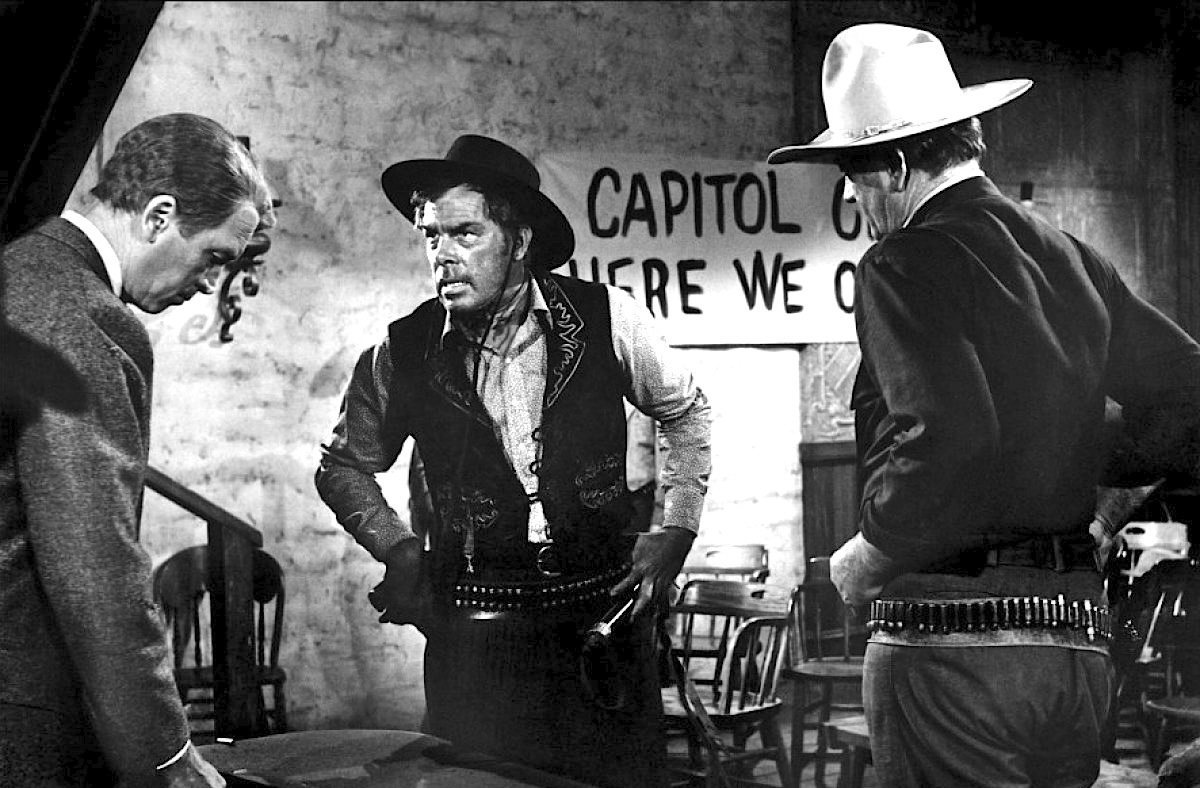I’ve watched hundreds of westerns over the years, and 48 years ago even wrote my doctoral dissertation on the politics of the genre from 1948 to 1962. I wasn’t surprised when movie watcher Hannah Long early this year called The Man Who Shot Liberty Valance (1962) the best western ever made: John Ford’s film makes the top 10 on just about everyone’s list. But only when I watched it again this year did I recognize that major themes parallel the name of this website (and print publication): Religion and Liberty.
That may be half obvious, since “liberty” is in the title. Liberty Valance (played gustily by Lee Marvin) robs stagecoaches and terrorizes the countryside. His “liberty” means acting on every violent impulse and sadistically whipping anyone who annoys him, such as lawyer Ranse Stoddard (Jimmy Stewart). Only the presence of Tom Doniphon (John Wayne), a rancher who can outshoot even Valance, holds the bandit loosely in check.
The day after rewatching Liberty, I read reviews of it on 100+ websites and in 19 academic journals. Some noted that Doniphon displays a positive liberty. He is free to come and go as he pleases. He is free to own his land and add a room onto his house to make it fitting for Hallie (Vera Miles), a pretty but illiterate cook. Then Ranse teaches Hallie and others both to read and to yearn for the rule of law. Hallie falls in love with him and the Constitution, which protects rightful, positive liberty.
The film heads toward its climax as Valance, with his rule of terror threatened, plans to kill Ranse. Others tell the lawyer to get out of town, but he refuses to go. Right and wrong head to a duel at night that the bad guy will clearly win. Doniphon, though, waits in the shadows and shoots Valance with deadly accuracy at the exact moment Ranse fires a wild shot. Townsfolk assume Ranse is the man who shot Liberty Valance: he moves onward and upward politically, becoming governor, senator, and ambassador, with a nomination as vice president in the works.
Some of the reviews I read analyzed Liberty’s political and legal philosophy. David W. Livingstone in Perspectives on Political Science was typical in saying the movie combined “classical political philosophy and the state-of-nature teaching of John Locke.” Several writers connected the film to Cold War speechifying, with the Soviet Union as Valance and world peace in the balance.
I wrote my own academic journal articles in the 1980s and managed to obtain tenure without once quoting French deconstructionist Jacques Derrida. He may have been harder to avoid in 2008, when Philosophy & Social Criticism author Camil Ungureanu related “Derrida’s force of law” to Liberty’s “dispositive pictorial representation and its deictic gestus.” (Deictic is a word or expression with a meaning dependent on context, like “next week.” Gestus was a word used by Bertolt Brecht to describe the context of gestures: for example, the audience views differently a soldier marching along an empty road and a soldier marching past corpses.)
It may not be sporting to wax sarcastic about language in academic journals, but I’m echoing the attitude of John Ford, who died in 1973, regarding the early scholarly analysis of his work. He often introduced himself with a simple, “My name is John Ford. I make westerns.” He said, regarding both fancy theorizing and fanboy praise, ‘‘I have been called the greatest poet of the western saga. I am not a poet. And I don’t know what a ‘western saga’ is. I think it’s all bullshit.’’
What did Ford care about? He believed in “show, not tell,” and all his props had a purpose. My undergraduate students in a course I taught on Westerns were most impressed by the size of portions on western cantina plates. Canadian professor Sue Matheson’s writing about Liberty followed academic fashion with its title, “Deconstructing the Legend,” but at least she paid attention to Hallie’s serving of “grotesquely oversized steaks with frying pans that would cover the entire cooking surface of an ordinary stovetop.”
What she and other analysts missed, though, was a word hiding in plain sight. I’ll introduce it via its deictic gestus. Ranse (Stewart) calls Doniphon (Wayne) by his first name, Tom, but Doniphon never reciprocates. Instead, 16 times he calls Ranse “pilgrim” in sentences like “Don’t fret about that, pilgrim” or “You’re a persistent cuss, pilgrim.” Liberty Valance also never addresses Stoddard by his first name: when he sees Stewart paying for his room and board by working in Hallie’s restaurant, Liberty three times calls him “hashslinger” and once “dishwasher.”
Yet Stoddard is unashamed about taking on the role of a servant: “I’ll be glad to help,” he says. The appropriately named Sheriff Appleyard, played by fat Andy Devine, is useless except as a comic character who wheedles for vittles: “l could sure use a snack of six or seven of those hen’s eggs, and maybe a side order of bacon.” Appleyard acknowledges the inadequacy of official law in Shinbone: “The jail’s only got one cell, and the lock’s broke, and l sleep in it.” The sheriff does not challenge Valance but Ranse does. Valance sees Stoddard as a potential threat, despite his humble cook’s apron: “Hashslinger, why are you standing there so high and mighty”?
Appleyard is the average resident of Shinbone, enjoying meat and potato dinners but afraid to look Valance in the eye. Stoddard is both lower and higher, a suffering servant in the restaurant but a teacher in a classroom where he not only teaches the illiterate to read but also shows them the value of reading. First, he offers Hallie the opportunity to learn: “I can teach you. … Do you want to try?” Her first response is, “What for? What good has reading and writing done you? Look at you in an apron.” Then she thinks more and says, “I know the Bible from preacher talk, but it’d be a soul comfort to read it myself.”
Who else is both higher and lower? Who else is both a teacher and a lamb? Who else is willing to sacrifice his life for the good of the town? Stoddard’s nickname is Ranse, but the sign he puts up on the front porch of the newspaper office that its editor now shares with the hashslinger/lawyer makes his calling clear: Ransom Stoddard, Attorney at Law.
Of the 100+ website notes about Liberty, I saw only one—on Second Reel in 2011—paying attention to Stoddard’s first name and offering a semi-explanation: “One of the definitions for ‘ransom’ given by Merriam-Webster is ‘to deliver especially from sin or its penalty.’ Ransom Stoddard certainly provides (at least by appearances) a deliverance from evil (evil in the form of Valance).”
What kind of deliverance? In the short story by Dorothy Johnson that was the basis for the film, the young attorney is Ransome Foster. In the movie, though, it’s Ransom. John Ford grew up in Munjoy Hill, a working-class neighborhood of Portland, Maine, with Saint Dominic’s his home parish. He remained a lifetime Catholic and knew the teaching in the official Catechism of the Catholic Church that says Jesus “gave his life as a ransom for many, the ransom that would free men from the slavery of sin.” Ford publicly downplayed meaning: “I make Westerns.” But some meanings sink in early and never run away.
This meaning, hidden in plain sight, makes sense not only in terms of Ford’s upbringing but in 19th century America as well. Hallie, who abandons Doniphon and marries Ransom Stoddard, would know about the meaning of “ransom” by hearing and eventually reading the then-standard King James Version of the Bible. The word “ransom” appears in it 16 times. Usages include: “For the Lord hath redeemed Jacob, and ransomed him” (Jeremiah 31:11). “I will ransom them from the power of the grave” (Hosea 13:14). “The Son of man came … to give his life a ransom for many” (Matthew 20:28). He “gave himself a ransom for all” (1 Timothy 2:6).
Thoroughly modern film reviewers might miss it, but Hallie and those who eventually vote for Stoddard know from “preacher talk” that Jesus, left alone in the Garden of Gethsemane at night as others planned to execute him, could have run away—but he deliberately stayed to become a sacrifice and save others. They know that Ransom Stoddard has the same option. He deliberately stays and faces Valance.
But there’s more. If Stoddard dies, the way is clear for Tom Doniphon to win back Hallie. But he sacrifices his own happiness by killing Valance, in that sense becoming Ransom’s ransom. Liberty is a layered cake of a film, building from a base in political philosophy to subtle teaching of theology. Yes, it’s about liberty, but it’s fit for a lesson in Religion and Liberty. So are many other westerns.

